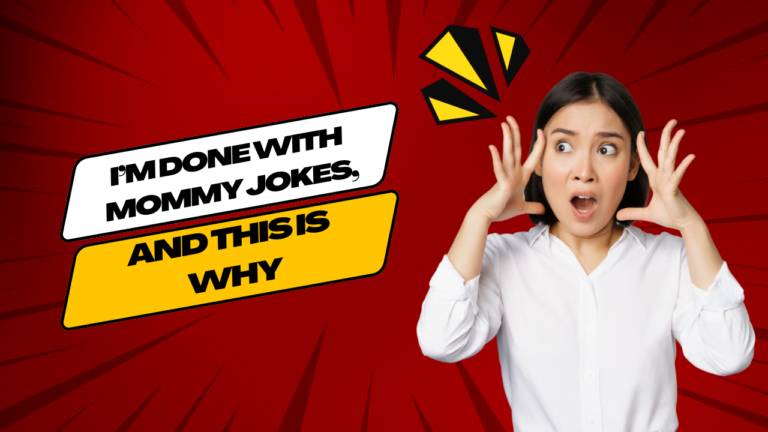Breaking the Silence on the Impact of Maternal Humor
For decades, ‘maternal humor’ has been a staple in comedy sketches, sitcoms and casual conversations. The often self-deprecating satire has resonated with moms as well as a swath of the general public, offering levity to the hustle and bustle of parenthood. Despite its wide use, maternal humor has long been a double-edged sword that frequently contains misogynistic barbs within its laugh lines. In this deep-dive Mommy Jokes blog post, we explore the complex layers of maternal humor, dissecting its impact and implications.
Why Maternal Self-Deprecation Isn’t Harmless
Maternal self-deprecation, often portrayed as benign and relatable, can have insidious effects. It often reinforces societal norms about motherhood and femininity, marginalizing women who don’t fit the ‘mom’ mold. By normalizing struggles and shortcomings, this brand of humor inadvertently contributes to a culture that doesn’t take the experiences and voices of mothers seriously.
Unmasking the Underlying Message
Peeling back the layers of any joke often unveils a more significant societal commentary. In the case of mommy jokes, the underlying message is often a subtle reinforcement of traditional gender roles. Women are portrayed as the harried, frazzled caretakers who are less competent and more emotionally fragile. This not only does a disservice to mothers, but it also shapes the way we view and treat women in any professional or non-domestic sphere.
Redefining Motherhood in Narrative and Jokes
It’s time to redefine what a ‘Mommy Jokes’ can and should look like. Maternal humor does not have to be at the expense of mothers and women in general. Instead, it should challenge norms, celebrate the diversity of motherhood, and empower women. By rewriting the narrative, we make room for more inclusive, empowering, and truly funny discourse around parenting and family life.
A Call to Content Creators and Comedians
The responsibility does not fall solely on individual mothers. Content creators and comedians have a unique opportunity to shape the narrative that reaches millions. There is immense power in choosing stories that portray a balanced, respectful, and nuanced view of motherhood. By doing so, they contribute to a cultural shift that uplifts and validates the experiences of all mothers.
How We, as Consumers, Can Demand Better
Consumer behavior plays a significant role in shaping media content. Awareness of the impact of maternal humor can change what content succeeds and what does not. By choosing to engage with and support media that presents mothers in a positive light, consumers can push for a change in tone and content.
Addressing the Serious Side of Motherhood with Humor
Despite our reservations about the current state of maternal humor, we also recognize the value of humor in navigating the challenges of motherhood. We celebrate the power of laughter to heal, bond, and make the heaviness of life a little more bearable. But this does not mean we accept any humor that comes our way. Instead, we advocate for a funny bone that’s more sensitive to the nuances of maternal experiences.
The Path to Inclusive and Empowering Maternal Humor
Inclusive and empowering maternal humor must come from a place of understanding and respect. It should be both relatable and aspirational, acknowledging the unique struggles of motherhood while celebrating the strength and resilience of women. This type of humor doesn’t just sparkle with wit; it also shines the light on the universal human experience in a way that uplifts and unites, rather than divides.
Crafting Humor that Transcends Stereotypes
Creators of maternal humor have the creative liberty to craft jokes that break free from stereotypes. By approaching motherhood with a fresh and liberated perspective, they can give birth to humor that resonates with a broader audience and transcends the limitations of clichés and gender roles.
The Role of Storytelling in Maternal Humor
Storytelling is a powerful medium that can humanize and elevate the maternal experience. By weaving compelling stories into their humor, creators can build rich, multifaceted characters that reflect the true diversity of mothers around the world. This approach not only entertains but also educates and engenders empathy.
Empathy as the Bedrock of Maternal Humor
At its core, humor should be an expression of empathy — an acknowledgment and appreciation of the shared experience. When rooted in empathy, maternal humor becomes a tool for connection and understanding. It becomes a conversation starter rather than a punchline that ends the dialogue on an important topic.
The Brighter Future of Maternal Narrative
Our vision for the future of maternal narrative and humor is undeniably hopeful. It’s a future where mothers are portrayed as complex, multifaceted individuals with dreams, desires, and a full range of emotions. It’s a future where humor serves not as a crutch to lean on but as a mighty bridge that connects us through the joyful, messy, and meaningful moments of life.
Conclusion
We stand at a pivotal moment where we can choose to reimagine and redefine maternal humor. This recalibration holds the promise of not only transforming comedy but of reshaping societal attitudes toward motherhood and women in general. It’s a tall order, but we’re done with mommy jokes that don’t respect the essential, often underestimated role of mothers. And from now on, we’re the architects of our laughter, building a foundation that’s firm, fair, and, yes, genuinely funny.


Comments are closed.